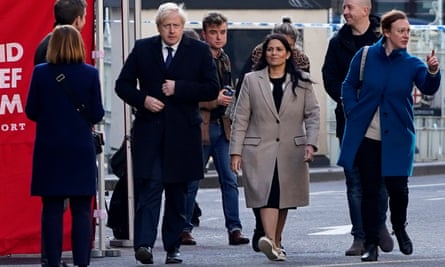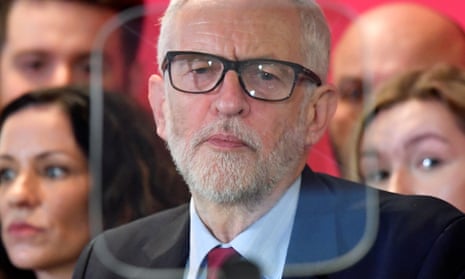Britain’s repeated military interventions have “exacerbated rather than resolved” the problem of terrorism, Jeremy Corbyn will warn today.
The Labour leader will use a speech to warn that the so-called “war on terror has manifestly failed”, adding that the world is “living with the consequences” of the botched invasion of Iraq, which he opposed. He will say that Britain risks being “tied to Donald Trump’s coat-tails” and US foreign policy under Boris Johnson.
His comments come just before Johnson hosts a Nato summit this week to be attended by the US president. Responding to the London Bridge attack in a speech in York, Corbyn will praise the “extraordinary bravery” of the public in confronting the attacker. He will say that the police were right to use lethal force, with lives at stake and the attacker wearing a fake suicide vest.
However, he will also say that while responsibility for acts of terror lies with “the terrorists, their funders and recruiters”, UK leaders “have made the wrong calls on our security”.
He will add: “The threat of terrorism cannot and should not be reduced to questions of foreign policy alone. But too often the actions of successive governments have fuelled, not reduced that threat.
“Sixteen years ago, I warned against the invasion and occupation of Iraq. I said it would set off a spiral of conflict, hate, misery and desperation that will fuel the wars, the conflict, the terrorism and the misery of future generations. It did, and we are still living with the consequences today.
“The war on terror has manifestly failed. Britain’s repeated military interventions in North Africa, the Middle East and South Asia have exacerbated, rather than resolved the problems.”
Corbyn will criticise cuts and warn that real security cannot be done “on the cheap”. His comments come as the prime minister announces that he will conduct the most wide-ranging review of Britain’s security, defence and foreign policy since the end of the cold war if the Tories win the general election. No 10 revealed the plan after Friday’s London Bridge terror attack, in which two members of the public were killed and three taken to hospital for their injuries. However, Corbyn will argue today: “Take the probation service, part-privatised in 2014, resulting in disaster. The most serious cases stayed in a justice system badly undermined by austerity. A failure to recruit has left huge staffing shortfalls and with staff supervising more cases than ever expected, posing a serious risk to our security.”

Johnson said that the examination of the UK’s security capabilities would be bigger than previous reviews as it would cover not just the armed forces but also intelligence, counter-terrorism and serious and organised crime. The prime minister suggested it would also review strategic and diplomatic issues, such as Britain’s place in the world after Brexit. Johnson said: “It will also consider global Britain’s foreign policy: British alliances and diplomacy; shifts of power and wealth to Asia; how we can best use our huge expenditure on international development; and the role of technology.”
Johnson insisted that despite Brexit the UK would want to strengthen cooperation with European Union nations on security, notwithstanding warnings from many EU leaders that Brexit will reduce UK involvement in organisations such as Europol and jeopardise access to its vital databases.
Senior Tories are anxious that Trump, who, during his two-day visit, is expected to face protests from NHS staff fearful that the service will be at risk in a UK-US trade deal, may seek to intervene in the UK election campaign in a way that could backfire on the Conservatives.
Trump is expected to be greeted on Tuesday evening outside Buckingham Palace by doctors, nurses and other NHS workers leading a protest of tens of thousands. They are planning to march from Trafalgar Square to Canada Gate when Trump and other Nato leaders meet the Queen at a 6pm drinks reception.
Last night 515 NHS nurses, doctors and other health professionals wrote an open letter to Trump demanding a guarantee that the NHS will not be targeted in any UK-US trade talks.
“We are particularly concerned about conversations over patents for pharmaceuticals and the potential for huge drug price increases for the NHS,” the letter says.
“To allay our worst fears, we request you publish new trade negotiating objectives that explicitly rule out any measures that will lead to changes to our pharmaceutical patent and procurement regime, explicitly state that the NHS is taken off the negotiating table.
“Anything less than this will not reassure us and will leave thousands of dedicated NHS staff in fear for the future.”
